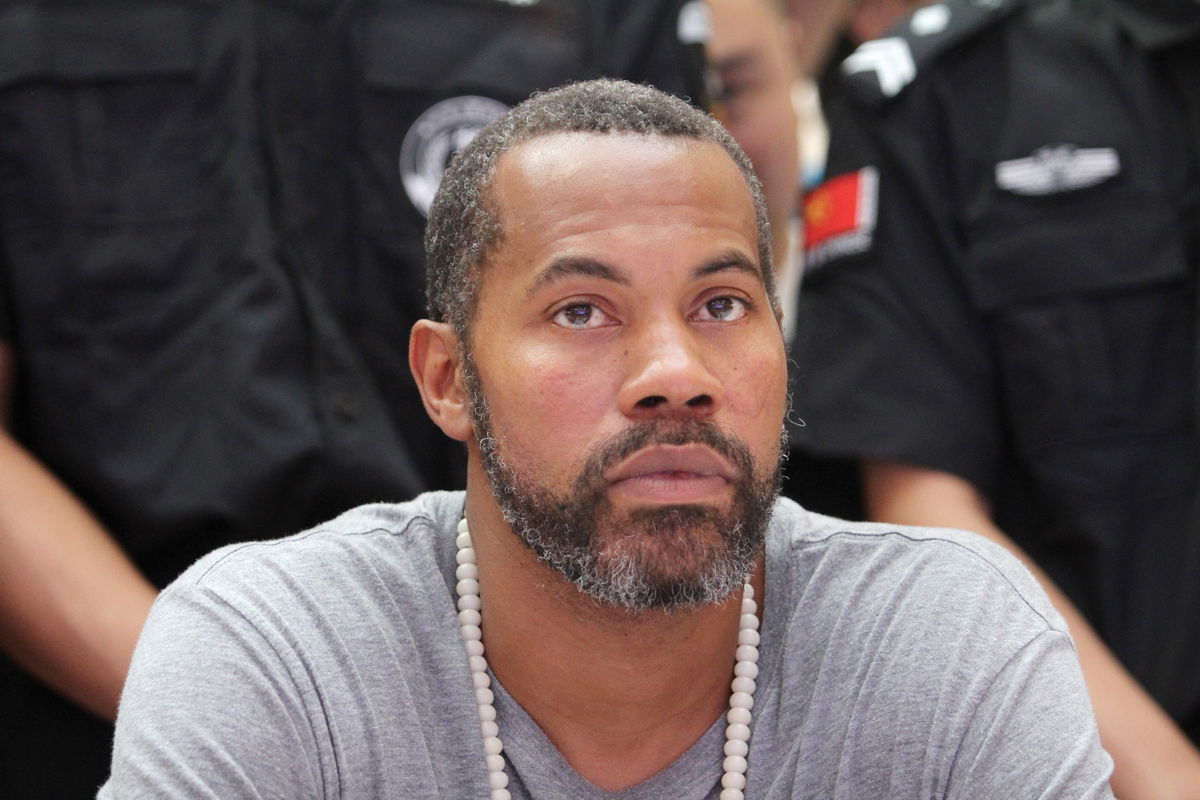
Getty
WUHAN, CHINA – JULY 15: Retired NBA players Rasheed Wallace attends the launching ceremony of OYTP (Outstanding Youth Training Program) basketball camp at Incity on July 15, 2018 in Wuhan, Hubei Province of China. (Photo by Visual China Group via Getty Images)

Getty
WUHAN, CHINA – JULY 15: Retired NBA players Rasheed Wallace attends the launching ceremony of OYTP (Outstanding Youth Training Program) basketball camp at Incity on July 15, 2018 in Wuhan, Hubei Province of China. (Photo by Visual China Group via Getty Images)
Rolls vs Rings. 2004 NBA champion Rasheed Wallace doesn’t think they are mutually exclusive. Back when Gilbert Arenas said he’d prefer James Harden’s over-$300-million champion-less legacy over ‘Big Shot Bob’ Robert Horry’s 7-championship rings, Sheed had a knockout response: “For me, I gotta get that ring. I might not be able to make $300 million… but I’m immortalized thought… immortalized in that city forever.”
Watch What’s Trending Now!
And a career that spanned from 1995 to 2013, Sheed did what he stood by. On the Sheed and Tyler podcast on August 25, he recalled, “I know back when I was playing we all stayed in town like nobody left to go back to their hometown or might go to visit but we all stayed in town as the veterans.”
“We all got money… whatever be the case we all making money.” Rasheed Wallace continued, “But, yo, we can make more money by winning,” he continued. This, coming from Wallace, who had spent a conflicted legacy in Portland for seven and a half seasons (1996-2004), isn’t quite surprising, to be honest.
ADVERTISEMENT
Wallace was volatile, and an anti-authoritarian figure who literally threw a towel at not just a referee’s face but his teammate too in another instance. Least of all, the media couldn’t even touch the Trail Blazers’ highest-paid player at that point in time for he had a cult-like following who worshipped the rebel, the emotional dunker, the untouchable turnaround jumper in him in the Beaver State, and beyond.
The only time long-time reporter covering for Portland Trail Blazers (since the late 90s till present), Jason Quick, got a word out of him was when he was eventually accompanied out of the locker room by Steve Kerr and Rick Brunson to save him from a charging Wallace. Regardless of the run-ins that left the 2000-01 team wondering whether they were a champion-worthy team had it not been for Sheed falling short of not being the go-to-guy on the paint among other reasons, the four-time All-Star power forward has his core circle of in-league friends and values intact.
It all came together when the Detroit Pistons and the Motown got exactly what they needed — a bad but tamed boy in Sheed joining an environment most known to him with a no-nonsense Joe Dumars as the VP and a fellow University of North Carolina alum and then-coach Larry Brown. History was made.
ADVERTISEMENT
Wallace was part of the 2004 Detroit Pistons team that stunned everyone with a championship win. With players like Ben Wallace, Chauncey Billups, and Corliss Williamson, the Pistons were not short on talent. But it was their collective bonding off the court that formed a key aspect of their success. In fact, Curry, Wallace, and Williamson all lived in the same suburban development and the team was often lauded for its strong work ethic that led to their success. On the show, former Portland Trail Blazers player, Bonzi Wells, also mentioned how “if you saw one piston you saw five of them,” highlighting the tightly knit unit they were.
In recent years, the Prime time of the Los Angeles Lakers with Kobe Bryant and Shaquille O’Neal in the 2000s is another great example of what good team chemistry can result in. Wallace then brought up how they would learn things by spending time with the veterans during the off-season. “When I played in Portland Cliff Robertson was my veteran ….and we would run pickup like you know just learning things from him and the other veterans Chris Dudley you know he would stay in Portland when I was out there too and just learning things from them during the summer offseason.”
ADVERTISEMENT
The main mantra for the 6-foot-11 former player-turned-coach for winning was better communication among the team members. His emphasis on how most of the current players are growing distant so that they can work on themselves and receive huge contracts or brand deals isn’t off the mark.
There’s been a rise in brand deals among today’s players. For instance, we can see players like Stephen Curry and Kevin Durant earning $50 million and $42 million per year, respectively from brands like Nike and Beats. Moreover, salaries have also increased compared to the previous two decades, with 2023/24 having an average salary of $9.7 million. This number touched $8 million at the turn of the decade and has only gone up compared to $4.64 million in 2010 and $2.92 million in 2000.
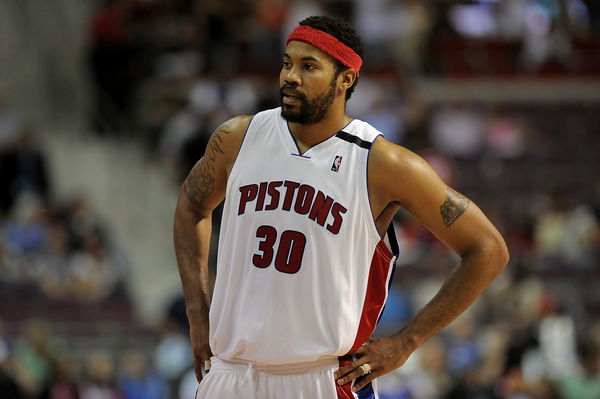
Getty
AUBURN HILLS, MI – APRIL 24: Rasheed Wallace #30 of the Detroit Pistons looks across the court in Game Three of the Eastern Conference Quarterfinals against the Cleveland Cavaliers during the 2009 NBA Playoffs at the Palace of Auburn Hills on April 24, 2009 in Auburn Hills, Michigan. The Cavaliers won 79-68. NOTE TO USER: User expressly acknowledges and agrees that, by downloading and or using this photograph, User is consenting to the terms and conditions of the Getty Images License Agreement. (Photo by Gregory Shamus/Getty Images)
However, the 49-year-old is not against players earning as much money as they can. After all, an NBA career might be brief, therefore, athletes must make the most out of their earnings potential. His message is more about finding a balance between chasing success and maintaining the camaraderie that makes sports so special. We have an example of the Warriors’ dynasty to learn from.
ADVERTISEMENT
The Golden State Warriors developed a bunch of players that grew together on and off the field. Stephen Curry, Klay Thompson, and Draymond Green were the core of this team and turned out to be more than teammates. The trio was quite close off cameras and off-court and it reflected in how they stopped teams in their track while playing. But even they have grown apart due to commitments to family and other obligations as Green mentioned in an interview in 2022 with ESPN.
Among other concerns, Wallace even highlighted the fact that players don’t have close squads now but like to be on their own, thus breaking the team camaraderie. But Wallace’s concerns about the NBA’s changing culture are nothing new. Over a decade ago, former Miami Heat player Ricky Davis compared the differences in locker room and how players would bond strongly off-court compared to what he saw back then.
ADVERTISEMENT
“Guys don’t go out. Guys don’t hang out. Guys aren’t out as a team hanging out all together. You used to go to a club and you could see a whole team together. Now there’s one or two guys. And I’m sure that’s the guys who came in in the ’90s,” he added. “The other guys are playing Xbox together. It’s different now,” Davis told Gartland in 2013. The evolving nature of the sport has brought in more than one change and it was another point highlighted on the Sheed and Tyler podcast.
Respected NBA reporter Jake Fischer also shed light on one of the growing trends that extend beyond team boundaries, highlighting what he calls the “Crew Culture” in the league.
ADVERTISEMENT
Fischer recalls his experience with Team USA in Manila
According to Fischer, another effect of money that can be seen among the players in the current times is that most of the players are traveling with a dedicated group of people rather than hanging out with the team. This group mainly consists of trainers, cooks, or someone assigned with a specific task. “The amount of money that these guys are making now also allows them to put their people on,” said Fischer during the same podcast.
He also described the scenes that he had encountered with the USA team in Manila, where he had seen the players having their own designated people to do weird things for them, like waking them up from sleep.
Top Stories
Klay Thompson to Cut Ties With Mavs — but $53M Problem Lingers, Per Insider
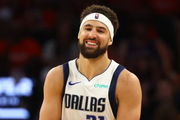
Dennis Schroder Breaks Silence as NBA Announces 6-Figure Punishment Over Luka Doncic Incident
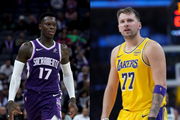
Steve Kerr Flatly Rejects Reality as Stephen Curry, Warriors Locker Room Admit Major Disadvantage
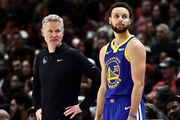
Are LeBron James, Luka Doncic Playing Tonight? Kings vs Lakers Latest Injury Report (Jan 12)
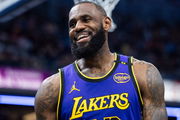
Coach Zach O’Brien Sends Clear Message on Unrivaled Officials After Controversial Breanna Stewart Call
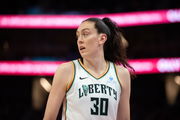
This trend reflects the recent changes in the NBA where player empowerment and individual branding have become more important. As the league continues to evolve, what new changes will we encounter next will be an interesting aspect to watch.
ADVERTISEMENT
Stay tuned for more such updates and join us for the exciting second episode of the “Dual Threat Show” as our host BG12 sits down with Georgia Bulldogs star and Mountain West All-Freshman Team Selection, Asia Avinger.
ADVERTISEMENT
ADVERTISEMENT
ADVERTISEMENT
ADVERTISEMENT

